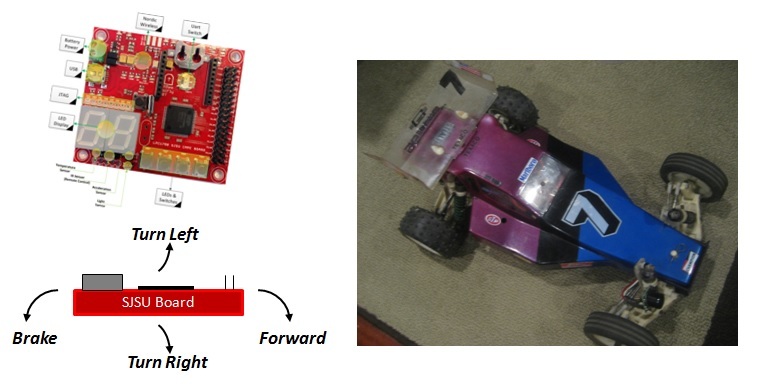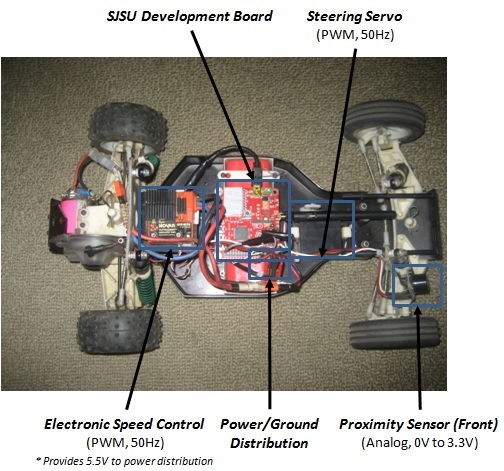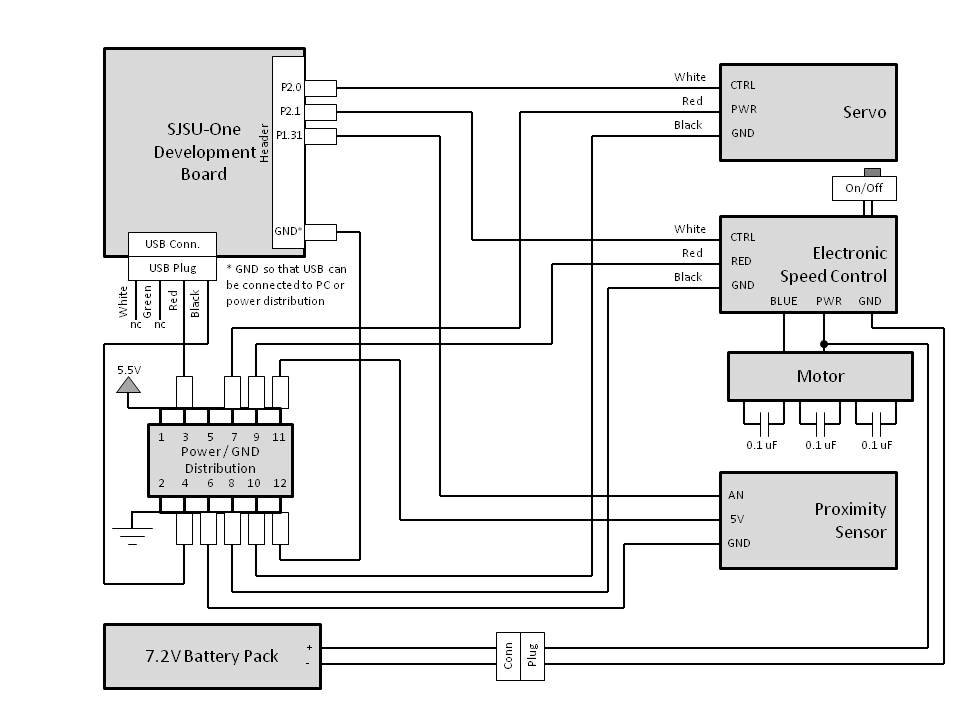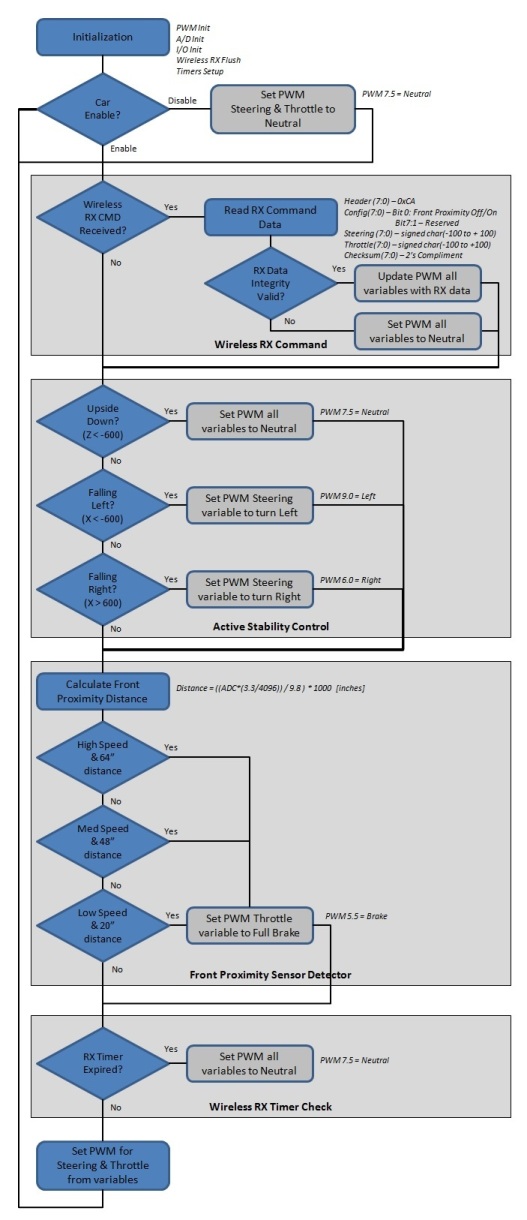Difference between revisions of "F13: Remote Control Car"
Proj user2 (talk | contribs) (→Hardware Interface) |
Proj user2 (talk | contribs) (→Hardware Interface) |
||
| Line 121: | Line 121: | ||
The TX board used the following interfaces: | The TX board used the following interfaces: | ||
| − | + | * | |
The RX board used the following interfaces: \n- PWM interface to steering servo (50Hz) | The RX board used the following interfaces: \n- PWM interface to steering servo (50Hz) | ||
| − | + | * PWM interface to electronic speed control (50Hz) | |
| − | + | * Analog to Digital Converter from proximity sensor | |
| − | + | * Accelerometer sensor to detect upside or flipping of car | |
| − | + | * GPIO to read switch values and output LED status | |
| − | + | * LED number display for error codes | |
=== Software Design === | === Software Design === | ||
Revision as of 04:11, 3 December 2013
Contents
Grading Criteria
- How well is Software & Hardware Design described?
- How well can this report be used to reproduce this project?
- Code Quality
- Overall Report Quality:
- Software Block Diagrams
- Hardware Block Diagrams
- Schematic Quality
- Quality of technical challenges and solutions adopted.
Remote Control Car
Using two SJSU development board to control a Remote Control Car.
Abstract
IN-WORK: This section should be a couple lines to describe what your project does.
Objectives & Introduction
RX Board Overview
TX Board Overview
TODO
Team Members & Responsibilities
- Alan Wang
- TX Board software development including:
- Develop driver for Acceleration Sensor (throttle and steering)
- Develop Wireless message protocol between boards
- Develop TX board software to transmit commands
- TX Board software development including:
- Curtis Woodworth
- RX Board software/hardware development including:
- Integrate hardware onto R/C Car (board, power, cable)
- Develop RX board software to control RC car
- Develop front proximity sensor detection software
- RX Board software/hardware development including:
IN-WORK: Show list of your objectives. This section includes the high level details of your project. You can write about the various sensors or peripherals you used to get your project completed.
Schedule
| Week# | Date | Task | Completion
Date |
|---|---|---|---|
| 1 | 10/8 | Identify R/C Car usage and ensure operation
Identify & Order parts needed Complete Project Proposal document |
10/8 |
| 2 | 10/15 | Setup & build R/C Car
Test R/C operation with nominal controller Develop pin list for I/O use & types |
10/15 |
| 3 | 10/22 | Develop Accelerometer software driver
Develop Server control software driver |
10/15 |
| 4 | 10/29 | Develop Transmitter data protocol
Develop Transmitter software driver Develop LED control software driver |
10/15 |
| 5 | 11/5 | Integrate accelerometer and transmitter drivers program
Integrate servo and LED control drivers into program |
10/29 |
| 6 | 11/12 | Integrate TX and RX development boards communications
Integrate & Test system with simulated R/C Car |
10/29 |
| 7 | 11/19 | Integrate & Test system with actual R/C Car | 11/18 |
| 8 | 12/3 | Demo Project
Finish report |
On-Schedule |
IN-WORK: Show a simple table or figures that show your scheduled as planned before you started working on the project. Then in another table column, write down the actual schedule so that readers can see the planned vs. actual goals. The point of the schedule is for readers to assess how to pace themselves if they are doing a similar project.
Parts List & Cost
IN-WORK: Give a simple list of the cost of your project broken down by components. Do not write long stories here.
Design & Implementation
The design section can go over your hardware and software design. Organize this section using sub-sections that go over your design and implementation.
Hardware Design
Discuss your hardware design here. Show detailed schematics, and the interface here.
Hardware Interface
In this section, you can describe how your hardware communicates, such as which BUSes used. You can discuss your driver implementation here, such that the Software Design section is isolated to talk about high level workings rather than inner working of your project.
The TX board used the following interfaces:
The RX board used the following interfaces: \n- PWM interface to steering servo (50Hz)
- PWM interface to electronic speed control (50Hz)
- Analog to Digital Converter from proximity sensor
- Accelerometer sensor to detect upside or flipping of car
- GPIO to read switch values and output LED status
- LED number display for error codes
Software Design
Show your software design. For example, if you are designing an MP3 Player, show the tasks that you are using, and what they are doing at a high level. Do not show the details of the code. For example, do not show exact code, but you may show psuedocode and fragments of code. Keep in mind that you are showing DESIGN of your software, not the inner workings of it.
RX Board Software Diagram
Implementation
This section includes implementation, but again, not the details, just the high level. For example, you can list the steps it takes to communicate over a sensor, or the steps needed to write a page of memory onto SPI Flash. You can include sub-sections for each of your component implementation.
Testing & Technical Challenges
Describe the challenges of your project. What advise would you give yourself or someone else if your project can be started from scratch again? Make a smooth transition to testing section and described what it took to test your project.
Include sub-sections that list out a problem and solution, such as:
Wifi Connection Issues
Many wifi connection issues were encountered. To solve this problem, a dedicated task was created to re-connect to wifi if the connection was ever lost.
Conclusion
Conclude your project here. You can recap your testing and problems. You should address the "so what" part here to indicate what you ultimately learnt from this project. How has this project increased your knowledge?
Project Video
Upload a video of your project and post the link here.
Project Source Code
Send me your zipped source code and I will upload this to SourceForge and link it for you.
References
Acknowledgement
Any acknowledgement that you may wish to provide can be included here.
References Used
List any references used in project.
Appendix
You can list the references you used.



